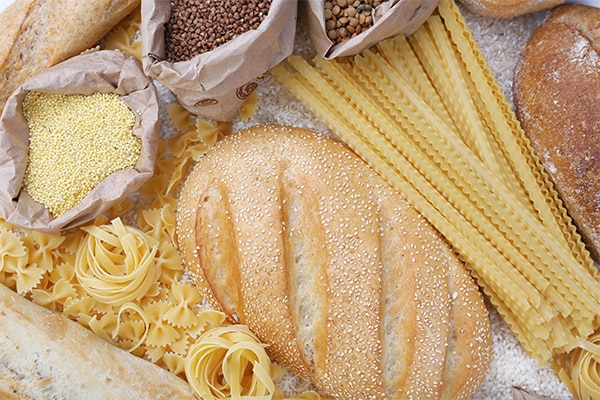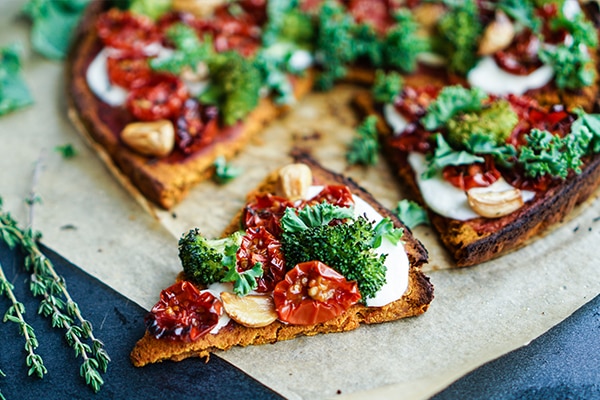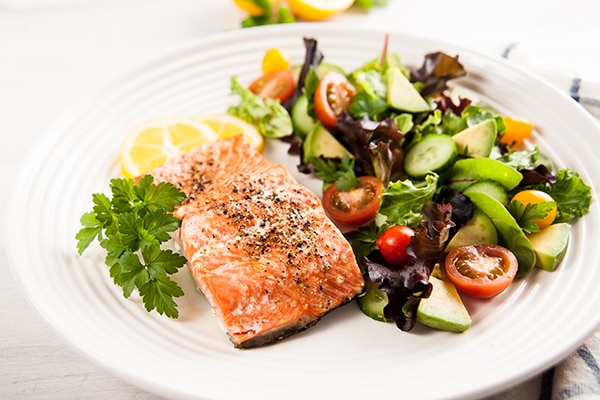10% off £35
The benefits of a gluten-free diet

In recent years, the gluten-free diet has become increasingly popular, with many celebrities talking about how they are avoiding foods that contain gluten due to sensitivities.1
Whilst the stars may talk about the health benefits of going gluten-free, if you don’t have a gluten intolerance or coeliac disease, is going gluten-free actually good for you? We’ve explored how the gluten-free diet impacts your body and whether you should consider giving it a go.
What is gluten?
What is gluten?
Gluten is the name given to proteins found in many popular foods such as bread, pasta, and some whole grains2. For some people, foods high in gluten can make them feel unwell, whether through a sensitivity or coeliac disease, an autoimmune disorder.
Who should follow a gluten-free diet?
If you don’t have celiac disease or gluten sensitivity it isn’t harmful, and you can eat foods that contain gluten.2 However, for those with a gluten sensitivity or coeliac disease, avoiding gluten is so important.


With coeliac disease, eating gluten causes the immune system to attack the body’s own tissues, which damages the lining of the small intestine.3 This prevents the body from absorbing key nutrients, leading to several symptoms, including abdominal pain, headaches, anaemia, and depression.4 As a result, the main treatment is to follow a strict, no-gluten diet to help control any symptoms and reduce the risk of long-term effects.5
Those with a gluten sensitivity should avoid gluten too, as the body can’t tolerate gluten. A gluten intolerance has symptoms like those of coeliac disease and can leave you feeling uncomfortable after eating gluten. Unlike coeliac disease, a gluten intolerance isn’t an autoimmune disorder.6 Following a gluten-free diet is believed to be the best method of easing the symptoms of a gluten intolerance and you should continue avoiding gluten even after you start to feel better.
4 potential gluten-free benefits
1. It may give you more energy
In some cases, if eating gluten makes you feel tired and lethargic, it could mean you have a gluten intolerance or even coeliac disease. This affects your ability to digest your food and absorb vitamins and minerals properly, which in turn, can leave you feeling run down.7
2. It may help with your gut health
Research published in 2017 in the Expert Review of Gastroenterology and Hepatology suggested that gluten may cause intestinal symptoms, even in people without celiac disease. These include altered gut function and irritable bowel syndrome (IBS).8


3. It may encourage you to eat more fresh foods
By cutting back on gluten, it may encourage you to eat more fresh fruits and vegetables, leading to a healthier way of living. Swapping a sandwich for a salad could definitely help if you’re trying to eat a more balanced diet.
4. It may help you maintain and control your weight
Many people say that they lose weight whilst on a gluten-free diet, and it’s thought that this can be attributed to the exclusion of some unhealthy foods and the consumption of more fresh foods like meat, fish, fruits and vegetables.9
The side effects of a gluten-free diet
Unless you have a diagnosed intolerance or coeliac disease, it’s thought that following a gluten-free diet doesn’t provide much of an overall benefit to your health and can negatively impact your nutrition.10
Foods that contain gluten, like some wholegrains, are great sources of nutrients like iron and protein, so if not followed with caution, a gluten-free diet can lead to deficiencies.11
Most gluten-free foods are made with refined grains too, which are much less nutritious and are even thought to be higher in fat, calories, and sodium.12
It is recommended that you try eating a healthier diet of less processed foods and more fruit, vegetables, and lean proteins before you cut out gluten altogether.13 You should also check with your GP to make sure that cutting out gluten is right for you before you do so.
However, as many as 83% of people with coeliac disease don’t know they have it. This means that foods like bread, bagels, pasta, pretzels, cookies, cakes, and crackers are making them feel unwell, and they have no idea why. If you feel ill after eating, it’s worth checking in with your GP, as they will help you find the cause and can offer suitable advice and help.


The bottom line
Following a gluten-free diet is a necessity for those with coeliac disease or a gluten intolerance to make sure they stay healthy. However, for those without, including gluten in your diet is perfectly fine and oftentimes, helps support your body by providing you with essential vitamins and minerals.
At the end of the day, choosing to go gluten-free is a personal choice for those without an intolerance or coeliac disease, but you must make sure you do so carefully. Keeping an eye on your nutrition is important, as well as checking with your GP that it is safe for you to cut out gluten in the first place.
1. https://www.mdpi.com/2072-6643/10/10/1410
2. https://celiac.org/gluten-free-living/what-is-gluten/
3. https://www.nhs.uk/conditions/coeliac-disease/
4. https://pubmed.ncbi.nlm.nih.gov/32950520/
5. https://www.nhs.uk/conditions/coeliac-disease/treatment/
6. https://www.beyondceliac.org/celiac-disease/non-celiac-gluten-sensitivity/symptoms/
7. https://www.ncbi.nlm.nih.gov/pmc/articles/PMC6352651/
8. https://www.sciencedirect.com/science/article/abs/pii/S0016508513001352
9. https://www.mdpi.com/2072-6643/10/10/1410
11. https://www.ncbi.nlm.nih.gov/pmc/articles/PMC5866307/
12. https://www.mdpi.com/2072-6643/10/10/1410
13. https://www.hopkinsmedicine.org/health/conditions-and-diseases/celiac-disease/what-is-a-glutenfree-diet
14. https://www.beyondceliac.org/gluten-free-diet/


.png)








